Pain Myths And Facts: How Bad Information Hurts Us All (Literally…)
Knowing the facts instead of the misconceptions can open up opportunities to avoid a whole lot of unnecessary suffering, for you, for your family (and for your patients if you are one of those amazing healthcare providers we love!).
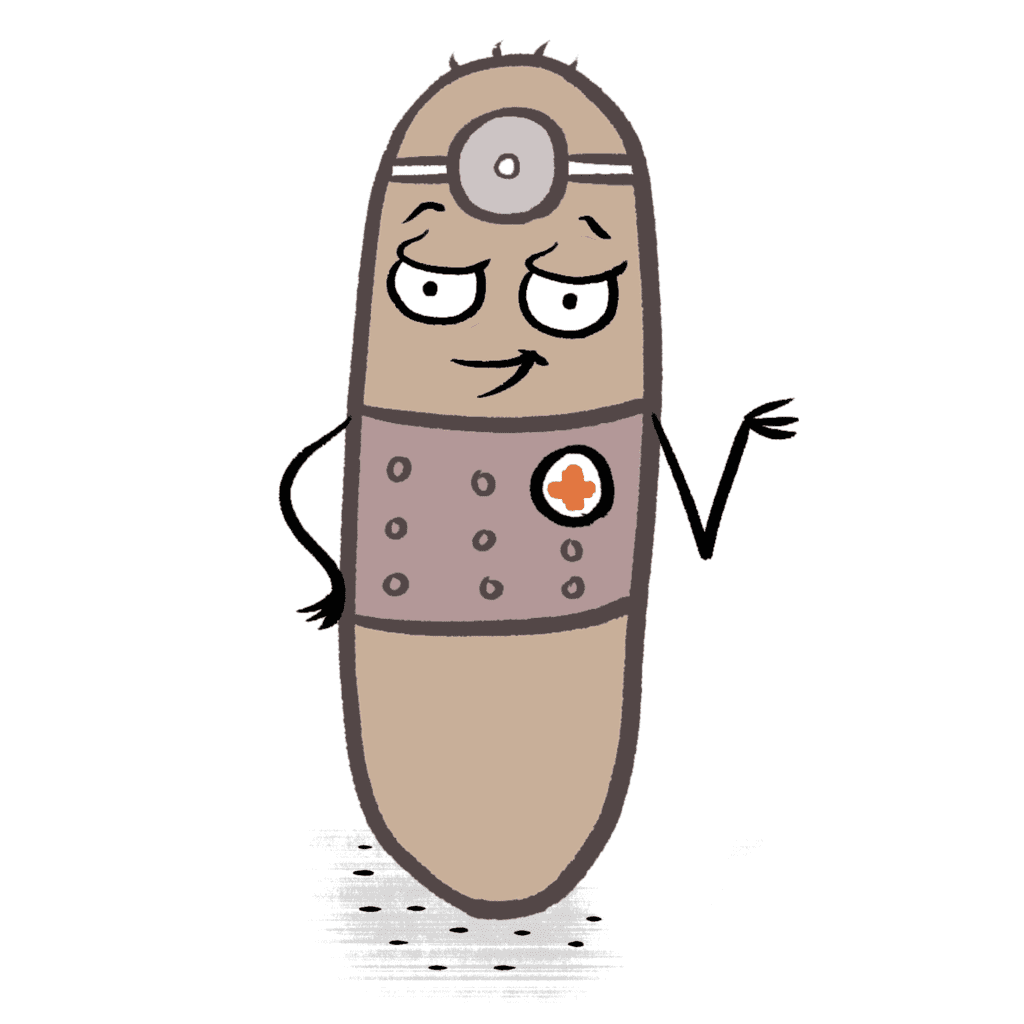
“Kids don’t have chronic pain….”
“They just need to suck it up…it’s not big deal….”
“This kid won’t even remember this procedure…don’t worry about it….”
“Of course, my doctor knows everything there is to know about how to handle pain….”
Nope, nope, NOPE, and probably not.
Why Myths About Pain Lead To More Pain
I’ve been a health psychologist specializing in pain and medical trauma for over 25 years. Every time I tell someone what I do for a living, the comments I get remind me of just how many people are taught and believe incredibly common-but-unhelpful myths about pain. Now, I understand that not everyone on the planet is going to be as much of a geek as myself and super into the science of pain, but the problem comes when it’s those very beliefs that are actually CAUSING pain…and much more than is necessary. What do I mean by that? Well, let’s go through some examples…
Knowing the facts instead of the misconceptions can open up opportunities to avoid a whole lot of unnecessary suffering, for you, for your family (and for your patients if you are one of those amazing healthcare providers we love!).
Pain isn’t actually always a necessary evil.
When I started the Meg Foundation, we knew that one of the major challenges we faced to helping people with needle pain (and the fear and anxiety around it) is the myth that the pain and distress around needle pokes is unavoidable…just a necessary evil one has to accept in life. The truth is that decades of research clearly show it is a very solvable problem with simple, cheap, and incredibly effective strategies. But it’s hard to give people a good solution when they don’t believe the problem is actually solvable. This is why we have to focus so much on outreach and marketing and depend on lovely people like yourself reading this piece to spread the word. This isn’t a money making venture for us…it’s an avoiding-human-suffering-making-people’s-lives-better-please-join-along venture for us.
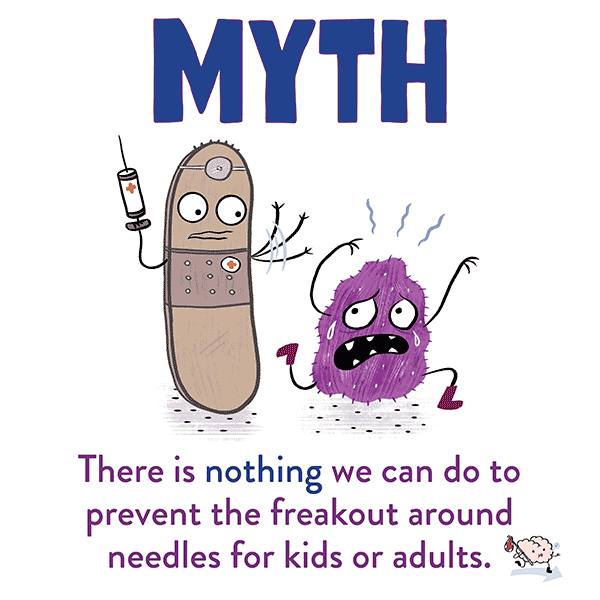
Turns out it is big deal…
The second big myth that causes major damage is that many people and medical providers think that kids’ anxiety and fear around needles and procedures is “not a big deal” and kids (and adults) need to “suck it up.”
After all, “they’ll forget it anyway.” We have a boatload of research evidence that this isn’t true. Turns out it is a very big deal, they don’t forget, and that the long-term consequences of not managing or acknowledging that fear is huge. What choices about health care do think kids make once they get too big for parents and providers to hold them down? At best, there is anxiety that affects their ongoing healthcare choices, and at worst, it’s severe, life altering trauma that can have devastating consequences.
In fact, most people you know are going to have a heck of a story if you ask them what they remember about going to the doctor as kids…and how that affects them today. Test the theory for yourself. And you know that friend or family member you know that refuses to go to the doctor? That one you worry about? The reason they won’t go is because they were traumatized by a bad experience, probably as a kid. They run the risk of being like a friend of mine who ended up dying of stage 4 cancer because he waited six months after symptoms showed up to get a blood test. Even now, you may be thinking “that’s crazy…no one does that…just suck it up and get the blood test.” But people do. They do every day. That story is not unique because the trauma is real. And frustratingly AVOIDABLE.
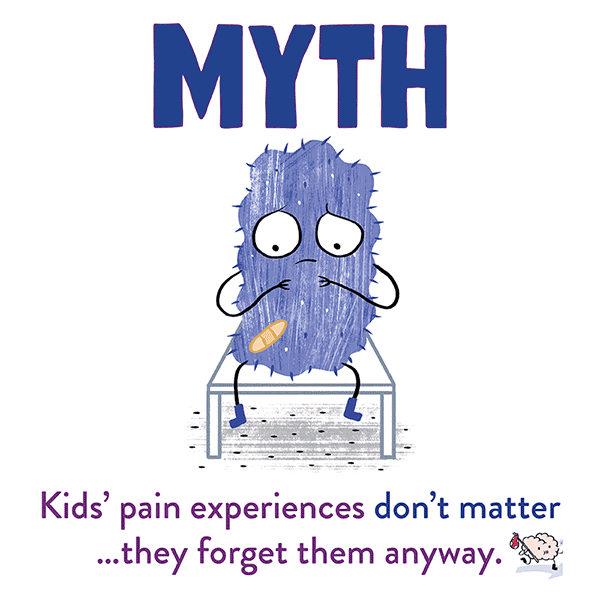
New doctors are learning old (and racist) myths
So yes, just those two myths cause unnecessary pain and suffering at a level that is frankly hard to wrap your mind around. And that just scratches the surface of harmful myths about pain. We could (and will more soon!) get into how myths and false beliefs play a major role in how systemic racism plays out in health care. Case in point? A stunning 50-73% of medical students and residents in one study endorsed false beliefs about racial differences in pain. That certainly plays a role in the fact that pain is consistently under-assessed, underestimated, and under-treated in the black population. This is true for both adults AND children.
The myth that pain is a purely biological process and simply the result of body tissue damage creates suffering and cuts off treatment options every day, especially for those millions of people with chronic pain. Understanding the truth that pain is a biological, psychological and social experience opens up all sorts of opportunities for treatment and healing.
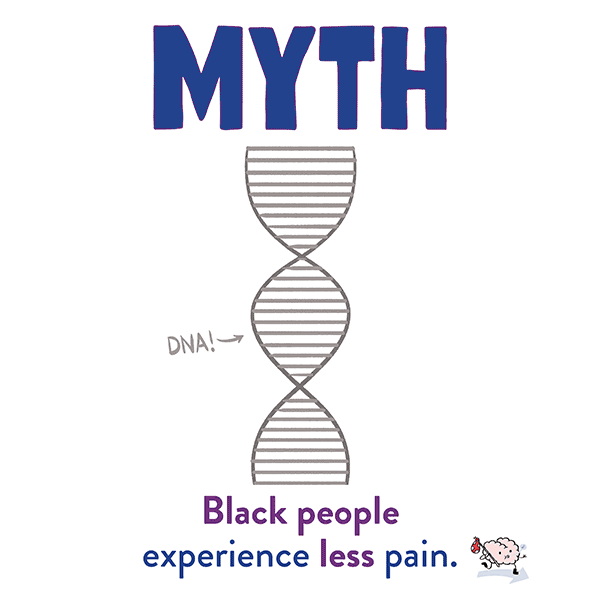
The pain experience is unique to the individual
Assuming pain is the same for everyone is a another major harm causing myth that blocks opportunities for treatment and healing…couldn’t be further from the truth! Sex, age, gender, mood, hormones, previous pain experience, trauma history (and on and on and on) all change how we experience pain. It’s as unique as the person themselves, and treating everyone the same is, bluntly, totally nuts and can blind people and providers to more effective treatment. This plays directly into the ridiculous but stunningly common myth that if something hurts you more that doctor thinks it should, it means you are wrong and crazy. This myth has facilitated medical gaslighting throughout human history.
That myth that even the best of doctors know all there is to know about pain is a dangerous game. After all, the stats would say that the average number of educational hours in pain over the course of medical training in the United States is just 7-10 hours. To put that in context, veterinarians have to have 150.
Not long ago while I was doing some consulting work, I stood in a room of about 50 medical residents and fellows (doctors near the end of their training). I asked if any of them could tell me about the biopsychosocial model of pain. THREE people raised their hands, even though it is absolutely the established way pain is now understood among experts. I told them the above stat about pain education hours in med schools and asked if any of them felt they had had more than that. Not a hand went up. I then asked what was the number on reason they were going to be called to the bedside in the hospital that day. Then I asked what was the number one reason that patients were going to come to their outpatients clinics. Pain, of course, was the answer to both. Clearly, the medical training system needs to do better. It’s not that docs and medical providers don’t care…they certainly DO care…but they often simply don’t know.
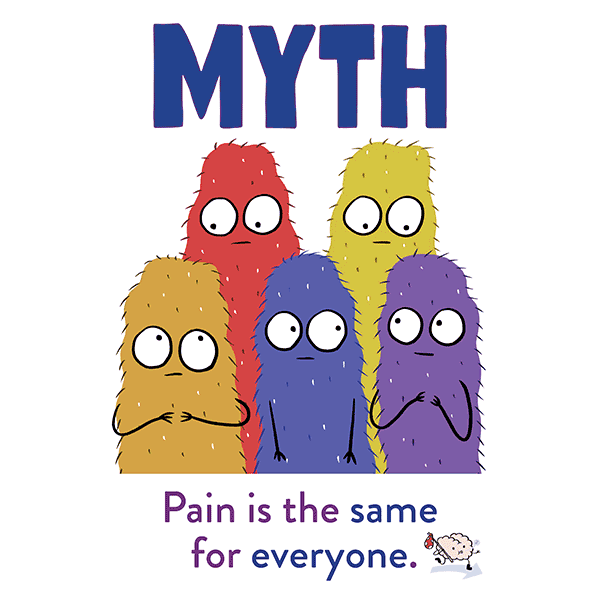
Your voice is NECESSARY.
Which brings us to our last harmful myth of today: that doctors will be mad and upset and not provider the same level of health care if you speak up and tell them what you or your child needs to be more calm and comfortable. Assuming we are all the lovely, respectful humans most of us are, they won’t. You and the medical team have the same goal: to help your child have the best, most comfortable experience possible with the best health outcomes. They are going to need your voice and your thoughts to do that. This is why we at the Meg Foundation talk about the need for effective family advocacy so much: your voice is NECESSARY.
And if you come across that rare doc does get upset? Well, you’ve just learned something about them…namely, that you need to find a better doctor. There is way too much ego going on in that situation.
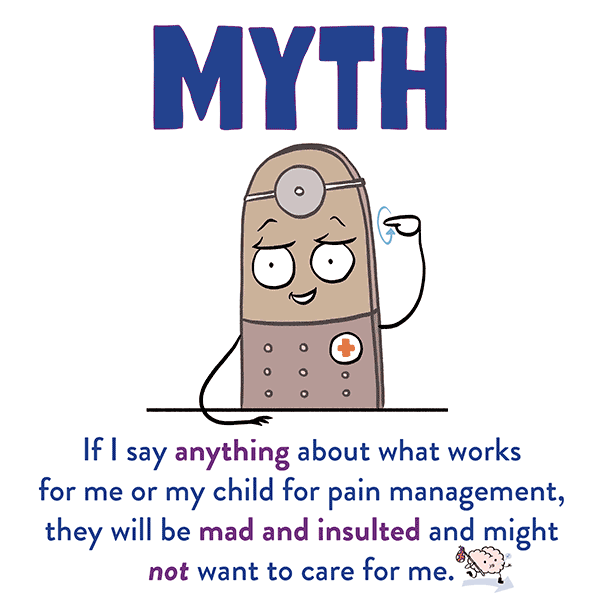

Explore our Understanding Pain Series to learn about more myths and misconceptions surrounding pain.
We’ve only just begun our journey of myths about pain. More to come. Why? Because you need to know the facts. Knowledge is power when it can lead to life changing action. Also, because in the wise words of cheesy 90’s PSA’s: the more you know…
You May Also Be Interested In
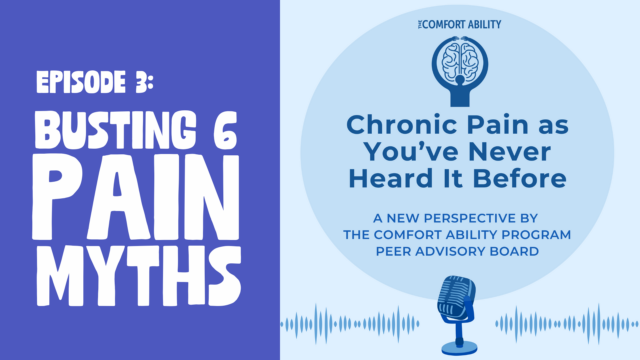
Podcast
Busting 6 Pain Myths
In this episode, our lived experience pain experts share some of their early misconceptions about pain and challenge Dr. Coakley and Dr. Riley to set the record straight.
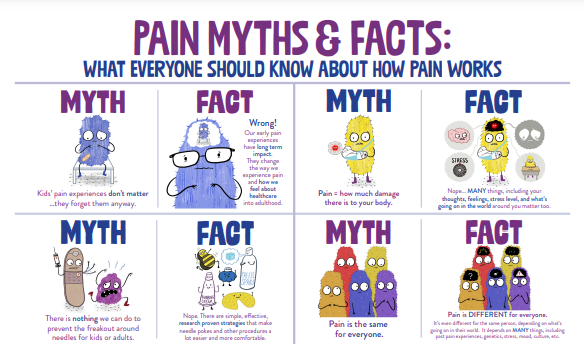
Downloads
Pain Myth & Fact Poster
This poster busts popular myths about managing pain with real facts backed by evidence. It's a handy resource for healthcare providers and families, helping everyone understand what really works for effective pain management.
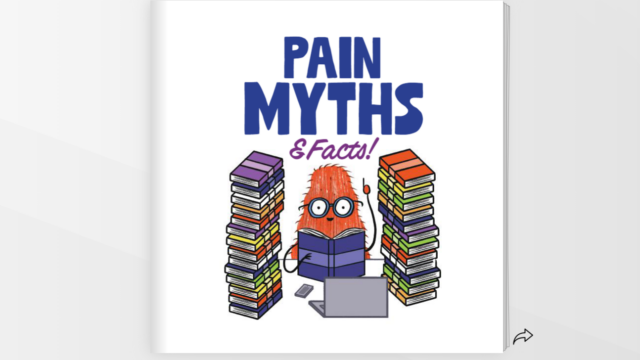
Book
Pain Myths & Facts E-Book
There's a lot of outdated thinking about pain floating around, but thanks to research, we now know better! It turns out that what kids, parents, and providers think they know about pain can sometimes hold us back from making things better. So let's dispel these misconceptions with accurate, evidence-based information and brighten things up with some solid facts!
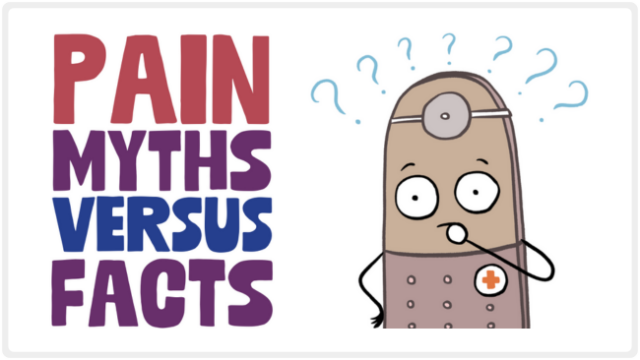
Blog Post
Pain Myths And Facts: How Bad Information Hurts Us All (Literally…)
Knowing the facts instead of the misconceptions can open up opportunities to avoid a whole lot of unnecessary suffering, for you, for your family (and for your patients if you are one of those amazing healthcare providers we love!).

Interested in helping us help even more people by putting our science backed resources out in the world? We need amazing people like you! Consider donating today!